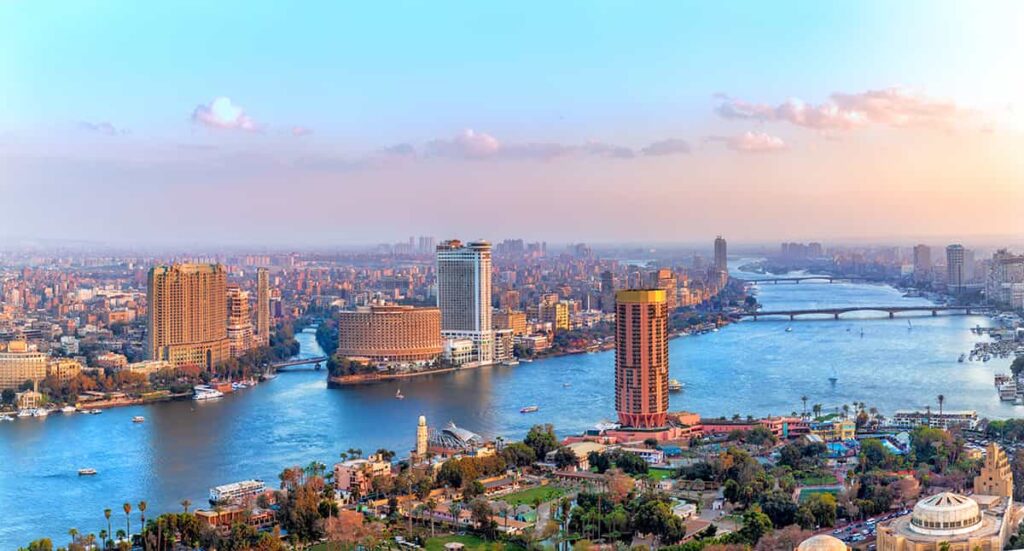Egypt Poised for Leadership Role with New Trade Agreement
Cairo, Egypt – Two recent in-depth analyses underscore Egypt’s exceptional potential to capitalize on a fully activated African Continental Free Trade Area (AfCFTA) agreement. These reports are injecting much-needed optimism into an economy currently weathering significant short-term geopolitical headwinds and grappling with surging inflation, which reached 38% in September last year.
“Egypt has the capacity to play a seminal role,” remarked Landry Signé, a senior fellow at the Brookings Institution and a professor at the Thunderbird School of Management. “Opportunities abound for SMEs (small and medium-sized enterprises) as well as larger corporations.”
These comprehensive reports coincide with last year’s $7 billion World Bank support program aimed at bolstering private sector employment, healthcare, education, and climate change adaptation in Egypt. A more recent $5 billion loan agreement with the International Monetary Fund (IMF), underscored by an additional $35 billion deal with the Emirati sovereign wealth fund ADQ, followed suit. The World Bank also augmented its commitment with a further $3 billion post-IMF agreement.
The AfCFTA-centric reports, compiled by the Organization for Economic Cooperation and Development (OECD) and South Africa’s Trade Law Center (tralac), highlight Egypt’s strategic position to both benefit from and drive forward the AfCFTA.
AfCFTA, inaugurated in 2021, represents the world’s most extensive regional free trade agreement. According to World Bank projections, the agreement could uplift regional commerce by 7%, equating to $450 billion, and elevate 30 million individuals out of extreme poverty by 2035. Although initially sluggish in trade volume uptake largely due to pandemic-induced lockdowns, AfCFTA has made substantial progress in administrative, legislative, and diplomatic arenas.
Egypt was among eight pioneering countries—alongside Cameroon, Ghana, Kenya, Mauritius, Rwanda, Tanzania, and Tunisia—selected in 2022 for a fast-track trial under the Guided Trade Initiative (GTI). Reports anticipate that at least 24 other nations will soon join the GTI, with projections suggesting this number could surpass 30.
In November, Cairo played host to the third Intra-African Trade Fair, facilitated by the African Export-Import Bank (Afreximbank) alongside the African Union and the AfCFTA Secretariat. Egyptian President Abdel Fattah al-Sisi, at the trade fair’s inauguration, emphasized Egypt’s commitment to building, developing, and cooperating in these ventures, albeit acknowledging potential obstacles.
The private sector appears aligned with governmental aspirations. “Egypt is earnestly striving to bring this to fruition,” comments Usama Elsayed, COO of BPC Banking Technologies. “The government’s official stance is to ensure seamless implementation.”
Presently, intra-African trade remains at a modest 15%, starkly lower compared to Europe (61%) and Asia (59%), per the OECD’s November publication, Production Transformation Policy Review of Egypt: Spotlight on the AfCFTA and Industrialization.
Exploring reasons behind this slow progress, the Foresight Africa 2024 report by the Brookings Institution’s Africa Growth Initiative, authored by Andrew Mold of the United Nations Economic Commission for Africa and Francis Mangeni of the AfCFTA Secretariat, points to several factors. These include the natural lag in establishing trade mechanisms similar to the European Union’s timeline, AfCFTA’s phased tariff reductions extending through 2035, and lingering non-tariff barriers.
John Stuart, an economist with tralac and author of one of the reports, notes logistical hurdles, particularly the Saharan Desert barrier between Egypt and Sub-Saharan Africa, as further complicating factors.
Egypt, alongside Nigeria and South Africa, stands as one of Africa’s foremost industrial hubs. While its trade focus has traditionally been directed toward Europe, the Middle East, North Africa (MENA), and Asia, these established trade relations could fortify its intra-African trade ambitions. As Brookings notes, the three largest economies—Nigeria, South Africa, and Egypt—maintain substantial trade surpluses with African partners, potentially facilitating a liberal import regime.
The OECD and tralac reports emphasize several priority sectors poised for development, including renewable energy, pharmaceuticals, logistics and transportation, clothing, textiles and apparel (CLT), and agribusiness and processed foods.
Another salient study by the World Economic Forum, with Landry Signé as lead author, highlights progress in various sectors including automotive manufacturing, where global companies have expanded operations across Egypt, Ghana, and South Africa. It also points to Egypt’s leadership in e-mobility startups.
Egypt’s involvement in global value chains, notably CLT, oil and gas, automobile manufacturing, and renewable energy, positions it to drive regional trade initiatives effectively, as delineated in the tralac brief Egypt’s Potential Trade Development Under the AfCFTA.
While Egypt remains a premier cotton producer, it has room to strengthen its manufacturing capabilities by integrating with lower-cost clothing producers across Africa. As Stuart noted, “They might be happy to import made textiles.”
By extending its supply chain expertise, Egypt stands to foster economic growth both within its borders and across the African continent, as concluded by the tralac document.
